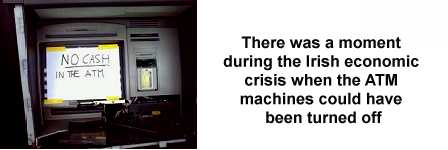In what is becoming a far-reaching examination of the disastrous events of 2008 to 2010 in Ireland the Irish Government committee set up to examine the issues has suggested that Newspaper editors and other media commentators may be called upon to give evidence.
This is something quite new in Ireland. Rarely has the Irish media been examined for its role in creating and fuelling news stories. And this is the news story about the single biggest economic event in the history of the country.

The collapse of the Irish banks was directly tied to the bursting of the property bubble, leaving the banks with huge debts. Unable to pay, the banks went cap-in-hand to the Government who effectively underwrote the debts, transforming private debt into public debt, and forcing years of austerity onto the shoulders of Irish citizens who had to re-pay the loans.
And to whom exactly were the loans repaid? To German, French and European bondholders who the EU/IMF/ECB ‘troika’ insisted be repaid or else they would declare the country bankrupt. The only option facing the Fianna Fail Government of the time was to agree to the European bullying, or else the lights would be turned off, ATM machines would stop working and within a few days the rioting and looting would begin.
This was the stark situation facing the Irish Government who were severely criticized and turfed out of office at the next election, to be replaced by Fine Gael and Labour (who pledged to ‘burn the bondholders’). The new coalition Government did not change the policies of their predecessors and instead reneged on their election promises and continued to cow-tow to Europe.
Recent attempts to have the EU/IMF/ECB include Ireland in new financial arrangements that would reduce the Irish debt burden have so far failed. And why should they allow Ireland a break? The Irish have already committed to repay the debt over the next two decades. The bondholders in Germany have already been repaid!
It is against this backdrop that the banking probe is being operated. The fact that several media outlets invested heavily in property and property-related websites may have caused a conflict of interest for them. The Irish Times famously and disastrously paid 50 Million Euro for the myhome.ie property web site at the height of the property bubble. The website is now worth a fraction of that amount.
The degree to which media editors drove the story, shaped public opinion and actually reported facts is certain to be of great interest to observers once the probe gets going.
Potentially this is political dynamite.
 Michael Green is Manager of The Information about Ireland Site
Michael Green is Manager of The Information about Ireland Site